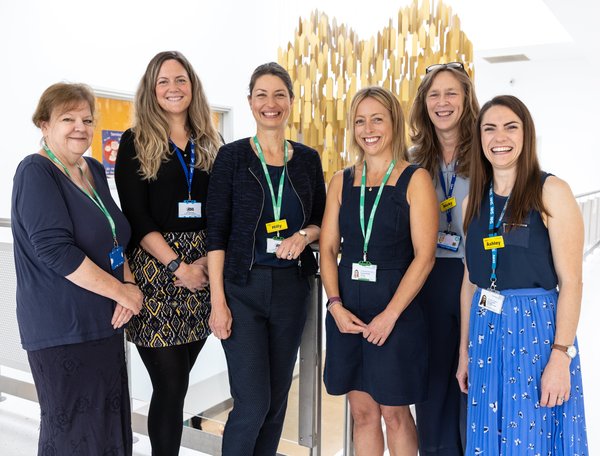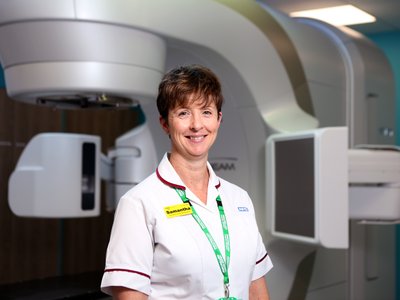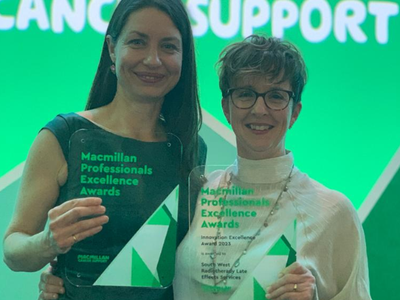Gloucestershire Hospitals cancer services teams scoop two prestigious national awards
Two services designed to support patients with cancer in Gloucestershire won their categories in the prestigious Macmillan Professionals Excellence Awards



The Cancer Haematology and Palliative Care Psychology Service won the Quality Improvement Excellence Award and the South West Radiotherapy Late Effects Service, part of which is centred in Cheltenham, won the Innovation Excellence Award.
Both these vital services were originally enabled by charitable funding. Now funded by Macmillan, the Late Effects service was previously funded by Cheltenham and Gloucester Hospitals Charity's FOCUS fund as a pilot and has gone from strength to strength. Meanwhile, the Haematology Psychology posts are funded by local blood cancer support charity Linc Charity and the first dedicated cancer psychology post for the Trust was funded by Macmillan in 2022.
The Radiotherapy Late Effects service
(winner: Innovation Excellence Award)
The radiotherapy late effects service aims to support people to live well with late effects of radiotherapy, offering lifestyle changes and management advice, prescribing medication, providing information or referring appropriately to other specialist services. It works in collaboration with many other Gloucestershire Hospitals services as well as community-based services.
Samantha Bostock, Macmillan Late Effects Lead Radiographer, explains: “The late effects of radiotherapy can develop after many years and patients therefore don’t always associate their symptoms with their previous cancer treatment. This can occur from six months to many years after treatment has finished and is due to permanent changes in tissues; chronic pain, incontinence and lymphoedema are examples of late effects.”
"Our service aims to reduce the impact radiotherapy late effects has on the person, reducing severity and pain, and not only improving quality of life but also the ability to function – including work, socialising and maintaining relationships.".
According to Macmillan, “This innovative collaboration brought equity of care across the region and embedded new pathways to patient needs. Often their patients develop late side effects that can be lifelong, life-changing and sometimes life-limiting. These symptoms can present long after treatment has ended and GPs have not always been able to hear them or to help them. This team formed a radiotherapy late effects service that provides crucial patient-centred support offering a holistic service that joined up all the dots. The judges absolutely loved the service transformation with patients centred at the very heart of it.”
One patient who was supported by the service at Cheltenham said recently said: "I would like to take this opportunity of thanking you for all your help and guidance over the past two years and your continued support. Whilst attending Cheltenham Oncology every day for radiotherapy obviously took a toll on my life, I do feel that without the expertise of the Late Effects of Radiotherapy Team, you lead, my life would have seemed intolerable.
"Your caring nature and the knowledge you have passed on has enabled me to have a good quality of life. You have given me confidence to try new ways to achieve a healthy lifestyle since my cancer and knowing you are always contactable to talk things through and express my feelings which, at times have been very low, has and still is immeasurable."
Patients who would like to access the Late Effects service can ask their GP or other healthcare professionals involved in their care to refer them via the details on our website
"I do feel this service is vital and valuable and may it continue to provide ongoing wellbeing for us all! Very many thanks."
Patient, Late Effects service, 2023
The Cancer, Haematology and Palliative Care Psychology Service (winner: Quality Improvement Excellence Award)
Historically, the Cancer, Haematology and Palliative Care Psychology Service at Gloucestershire Hospitals operated like separate, tertiary services with little integration into treating teams. They offered individual therapy to cancer patients, but when COVID led to a significant increase in referrals, the team knew they needed to do things differently to meet the demand.
The team set about designing an ambitious programme of change that aimed to create a proactive, preventative and integrated service that offers psychologically-informed care earlier in the patient pathway.
The team has developed numerous initiatives, including webinars for and with patients packed with proactive psychological tips, a pilot offering early psychological support to under-represented head and neck cancer patients, and impactful interventions with our prehabilitation and rehabilitation teams.
Alongside their patient-facing work, the team also offer an extensive package of training and supervision non-psychology colleagues. Macmillan Consultant Clinical Psychologist Dr Hilly Webb-Peploe says: "It's about more than one-to-one referrals, it's about making psychological knowledge accessible to patients in different ways,"
Outlining why the project was the winner in its category, the awards panel said it was "exemplary” and “Simply outstanding. A real master class in quality improvement (QI), from concept to delivery, to evaluation, all rooted in lived experience and staff wellbeing," with “impressive outcomes and impacts…a nd significant improvements in staff skills and confidence and patient quality of life."
Commenting on the support they've received from the psychology service, patients said
“It really changed and saved my life.”
“They were really understanding and helped immensely with stabilising my mood… she always knew how to calm me down & streamline my thoughts.”
“They helped me manage the side-effects of treatment and provided a structured way of moving forward.”
Patients who would like to access this psychology service should speak to their specialist nurse, or a member of their medical team who can discuss a referral with them
“It’s given me hope, encouragement and perspective. It made me feel human again.”
Patient, Cancer, Haematology and Palliative Care Psychology Service, 2023
Read more about the Macmillan Professionals Excellence Awards